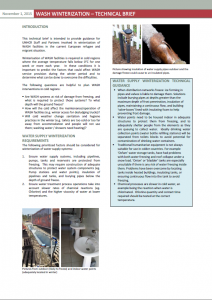The UNHCR WASH Manual Part 1: Programme Guidance, provides practical guidance for WASH programmes in refugee settings.
- Tags: camp management, Child Friendly Facilities, and WASH Reporting. Categories: WASH Manual.

The UNHCR WASH Manual Part 1: Programme Guidance, provides practical guidance for WASH programmes in refugee settings.

This report is based on a desk-based review of secondary data, comprising published material as well as grey literature, supplemented with key informant interviews for programmes that lacked documentation. Section One summarises the current use of CBI in WASH programming. Section Two summarises the best practices and lessons learned including challenges faced, drawing on evidence from the project examples found. Section Three provides recommendations and best practice guidance for use of CBI in refugee settings. Section Four details existing tools and guidance.

A sample organigram for running a typical refugee WASH programme for 20,000 people in a post emergency camp based setting. The organigram gives an indication of how the WASH Team should be structured in addition to the tentative number of Coordinators, Team Leaders, Officer, and Assistant level staff that should be recruited.

This document describes UNHCR’s global strategy for public health through a set of guiding principles and strategic approaches including protection; age, gender and diversity; equity; access; sustainability; community empowerment; appropriateness and reliability; partnerships and coordination; capacity building; communication and advocacy; integrated approaches; measurement and monitoring; and innovation. The document describes strategic objectives and enabling actions per sub-sector (Public Health, HIV and Reproductive Health, Food Security and Nutrition, and WASH).

This technical brief is intended to provide guidance for UNHCR staff and Partners involved in winterization of WASH facilities in the current European refugee and migrant situation.

This document has been designed to help UNHCR and WASH actors assess WASH infrastructure for potential access from the individual perspective of each type of vulnerable user in particular persons with disabilities, women, children, and the elderly.

This document provides health and safety guidelines for refugee WASH programmes for staff are involved in either: cleaning of toilets; maintenance of toilets; desludging of toilets; the collection and movement of excreta; the collection or movement of solid wastes; the handling of vector control or water treatment chemicals; any staff who may potentially come into contact with excreta, sewage, wastewater, solid waste, medical waste or any other sources of (potential) infection.

This brief is intended to highlight key elements of an effective response to an outbreak of hepatitis E virus (HEV) infection in refugee setting. It focuses on specific response actions, including the review of common risks associated with health, water, sanitation, and hygiene (WASH). The overall implementation of response actions and mode of operation should be context specific, as highlighted by the examples given from Dadaab (Ifo) Kenya and South Sudan.

This brief is intended to highlight key WASH elements for camps closure. It focuses on specific actions, including the highlights of public health risks associated with health, water, sanitation, and hygiene (WASH) when dealing with decommissioning of WASH infrastructures. The overall closure implementation actions and modus operandi should be context specific and properly planned in coordination with key stakeholders.